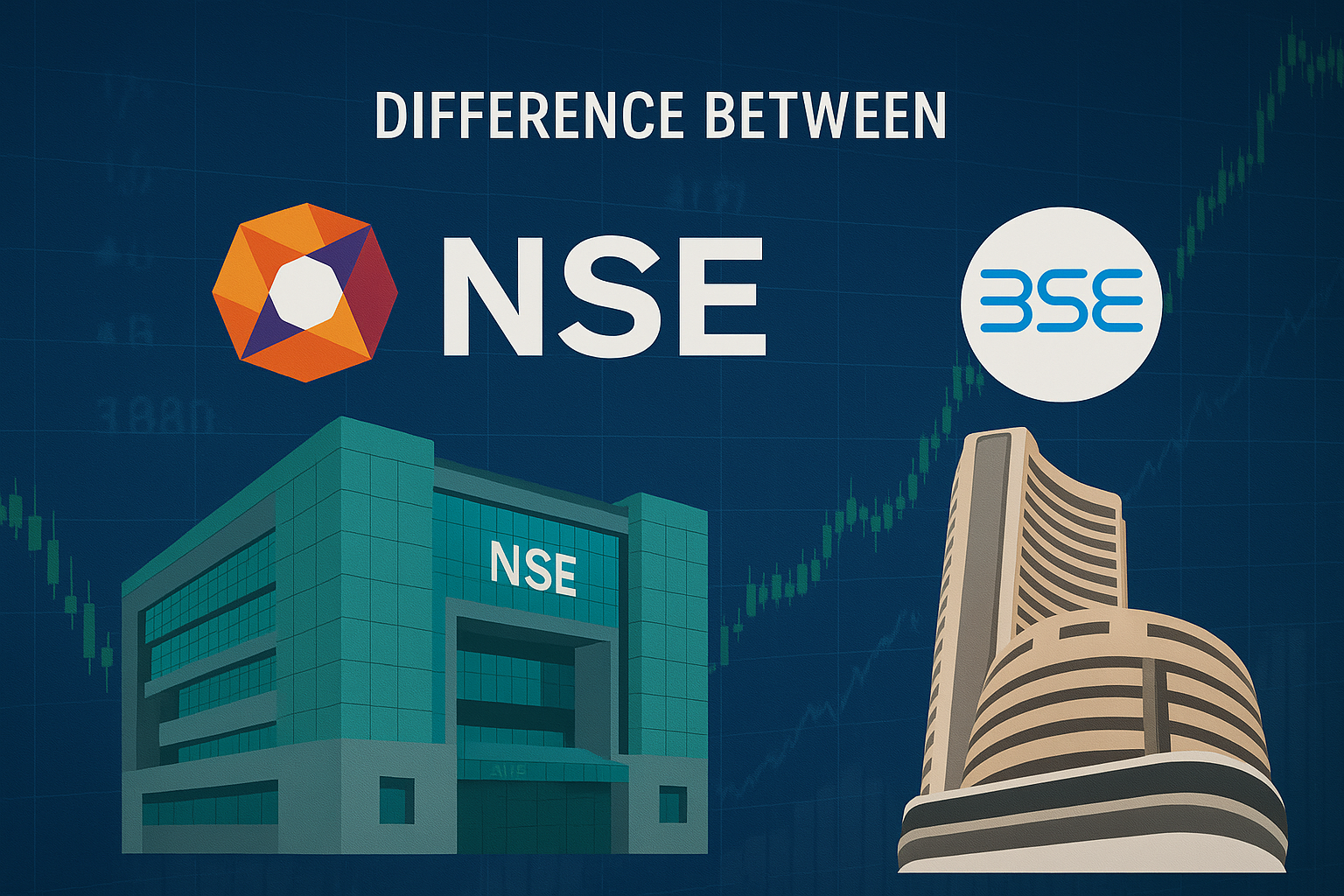Difference Between NSE and BSE
NSE and BSE are the oldest, prominent, and most traded stock exchanges in India. Investors should have the Basic information about NSE and BSE. NSE stands for “National Stock Exchange” whereas BSE stands for “Bombay Stock Exchange”. Both these exchanges have facilities to buy and sell securities. Both of these exchanges are regulated by SEBI (Securities and Exchange Board of India). In this blog, we will explore both of them in detail.
Date of Establishment
BSE is the oldest stock exchange in Asia, which was established in 1875. NSE was established in 1992. It started operations in 1993.
Number of Listed Companies and Market Capitalization
There are over 5000-plus companies listed on the BSE. Around 2000-plus companies are listed on the NSE.
BSE has a higher market capitalization than NSE, as many large-cap companies are listed on BSE.
But NSE has a larger trading volume and turnover.
Trading Platforms
Both exchanges offer various trading platforms, including:
BSE:- BOLT (BSE Online Trading) and BSE Star MF (for mutual funds)
NSE:-NEAT (National Exchange for Automated Trading) and NSE Mutual Fund platform
Indices
The benchmark index of the NSE is the Nifty 50. Nifty 50 comprises of top 50 performing companies of NSE.
SENSEX is the benchmark index on the BSE. SENSEX comprises the top 30 companies of the BSE.
Trading Hours
Both exchanges have similar trading hours:
|
Trading Hours |
Pre-open session |
Post-open session |
|---|---|---|
|
Monday to Friday: 9:15 AM to 3:30 PM IST |
9:00 AM to 9:15 AM IST |
3:30 PM to 4:00 PM IST |
|
Saturday / Sunday Closed for trading |
Listing Requirements
Both NSE and BSE have the same requirements for listing.
- Minimum paid-up capital: ₹10 crores
- Minimum public shareholding: 25%
- 3-Year Track Records
As stated earlier, both exchanges are controlled by SEBI. SEBI ensures that investors’ interests are well-protected. There is also a system of grievance mechanisms in both exchanges.
Key Differences between NSE & BSE
|
Criteria |
National Stock Exchange (NSE) |
Bombay Stock Exchange (BSE) |
|---|---|---|
|
Establishment Yr. |
1992 ( Operations Started in 1993) |
1875 ( oldest stock exchange of Asia) |
|
Index |
NIFTY 50 (Consists of the top 50 companies of NSE) |
SENSEX (Consists of the top 30 companies of BSE) |
|
Current value |
25,044 (as on 24th June 2025) |
82,055 (as on 24th June 2025) |
|
Listed Companies |
2,000 Plus Companies |
5,000 plus Companies |
|
Ownership |
Owned by Financial Institution Group (Like.. LIC, SBI, etc.) |
Owned by BSE Ltd., Public Limited Company. |
|
Regulatory Authority |
SEBI |
SEBI |
|
Trading Platform |
NEAT (National Exchange for Automated Trading) |
BOLT (BSE Online Trading) |
|
Market Capitalization |
1.131 Trillion( In June 2025) |
$2.25 Trillion. ( In June 2025) |
|
Liquidity |
Higher liquidity (due to derivatives dominance) |
Lower liquidity compared to NSE |
|
Global Ranking |
10th largest (by market cap) |
9th largest (by market cap) |
|
Investor Base |
More institutional & FII participation |
More retail investor participation |
|
Derivatives Trading |
Dominates the Indian derivatives market (90% share) |
Smaller share in derivatives |
|
Transaction Speed |
Faster settlement |
Slightly slower compared to NSE |
|
Popularity |
Preferred for derivatives & algo trading |
Preferred for SME listings & IPOs |
Conclusion
Both NSE and BSE are important stock exchanges in the Indian stock market. Both of them use different trading platforms. NSE uses the NEAT (National Exchange for Automated Trading) platform, whereas BSE uses BOLT (BSE Online Trading). SEBI regulates both of the stock exchanges. 2000-plus companies are registered with the NSE. Approximately 5,000-plus companies are registered with the BSE. NSE is slightly faster in settlement than BSE. NSE is the world’s 10th largest by market capitalization, and is preferred for derivatives and algo trading. BSE is the world’s 9th Largest by Market capitalization and is preferred for SME listings & IPOs
Frequently Asked Questions
1. How many stocks are there on the NSE and the BSE?
NSE has more than 2000-plus stocks listed, and BSE has 5000-plus stocks listed.
2. Who owns NSE?
NSE is owned by many financial institutions like SBI, LIC, etc.
3. Who owns BSE?
BSE is owned and operated by BSE Limited. BSE Limited is a listed company.
4. What are the benchmark indices of NSE and BSE?
The benchmark indices are Nifty 50 (NSE) and S&P BSE Sensex (BSE).
5. Which is the oldest, NSE or BSE?
BSE is the oldest of the two. BSE was established in 1875. It is the oldest stock exchange in Asia. NSE was established in 1992. It started its operation in 1993.
The reader will also like to read about the following topics
2. Basics of Future and option
3. PE Ratio
5. Bull vs Bear Phase in Stock Market


1 thought on “Difference Between NSE and BSE”